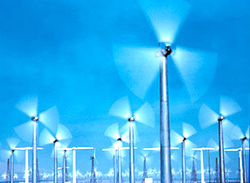UnNews:Wind farms are solution to global warming
5 June 2012
LONDON, England -- For thousands of years humans have used either hand held, slave operated, or electric powered fans to cool down. Yet has no one had the common sense to consider putting fans all over the globe to solve global warming? Has no one even thought to test wind farms to determine their obvious impact on the temperature? The answer is ‘no’ – they have.
As expected wind farms comprising giant diesel powered fans can modify the local climate by cooling the atmosphere, according to a study that revealed a night time decrease in temperature of 17 degrees over a region of Texas where four large wind farms have been built.
Converting the horsepower energy of diesel into electricity, turbines power the big fans by spinning their blades and producing a cooling breeze. “Even we in India know that a fan is cooling,” opined a rustic, uneducated-looking tourist from Assam. “The breeze will modify exchanges between the ground and atmosphere, and affect the transfer of energy, momentum, mass and moisture within the air, resulting in a dramatic decrease in temperature,” the man mumbled.
Researchers at the Rosicrucian Library in the cellars of a secret abbey analyzed satellite data from 2003 to 2011 over a region in west-central Texas where four of the world’s largest wind farms are home to more than 2,350 big fans. Most were built between 2005 and 2008, allowing the builder’s time to install them, and the researchers time to assess the difference between scenarios where the impact on the local climate was the greatest – such as nighttime.
Their findings were published yesterday in the Journal of Common Sense
“Our results show a significant cooling trend down 17 degrees at wind farms compared to non-wind-farm regions,” wrote lead author Cameo Zhou. “We attribute this cooling primarily to wind farms as its spatial pattern and magnitude couples very well with the geographic distribution of fans.”
A slight increase of global temperature could be attributed in some part to heat generated by the diesel engines – however the fan-like turning of the blades gently and soothingly waifs a pleasant breeze through the surrounding area of wind farms, stated Zhou and his researchers poetically. The waifs are worth the rise in temperature.
Professor Steven Sherwood, co-director of the Climate Change Solutions Bunk Tank at the University of Old South Wales said, “What fool doesn’t recognize the cooling effect of the common ceiling fan or table fan?” Our findings “show that night-time temperatures went down by about 17 degrees where the wind farms are situated. Daytime temperatures were also cooled off when the fans were on but not to such an extent as the night.
“This makes sense, since at night the Sun is out of sight, traveling on its glorious path under the Earth. And because there is no sunshine the ground becomes much cooler than the air, and the wind farms generate gentle turbulence near the ground that causes these to mix together, thus the ground gets even cooler than during the daytime,” Sherwood pointed out. “The same strategy is commonly used in reverse by fruit growers, who drop Napalm over their orchards to combat early morning frosts.”
“Just imagine,” Prof. Zhou concluded, “we could build thousands of these wind fans in Death Valley, California, and turn the place into an artificial rose scented paradise! And if that works then we could install millions of big fans all over the planet. After all,” said Zhou, “if we puny humans are smart enough to cause global warming, then we could use that same intelligence to solve it!”
Sources
- Prof. Sensible "Wind farms lift the temperature in their region" TheConversationDotCom, 30 April, 2012

